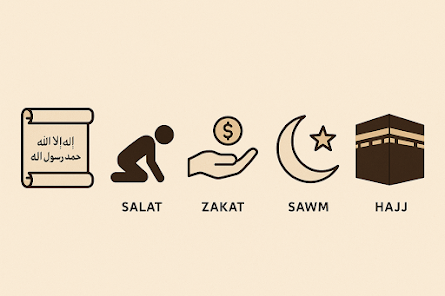Invited, Not Compelled | My Experience with the Qu'ran's Meccan Suras
I finally finished reading the first of two main sections of the Qu'ran, the main scripture in Islam. Let me state very clearly that I am not an expert in Islam and the Qu'ran. However, the topic of Islam if often a heated one in the West, with polarized views on all sides of the political and religious spectrum. One thing many people miss in the discussion of Islam is the stark difference between the Meccan and Median suras. While the Meccan suras are an invitation and warning during Mohammad's time of seeking converts in the city, the Median suras occur after his move from Mecca to Media, which follow his transition into seeking political power (watch my video HERE addressing this topic). Yet, having finished reading most of the Meccan suras, I find myself moved and in deep resonance with the invitation it offers.
Warning About Judgement Day
The Meccan suras, revealed to the Prophet Muhammad (peace be upon him) during his initial ministry in the city of Mecca, came at a time of Mohammad's struggle to convert the city's populace to monotheism. It is in this environment that Allah reveals to Mohammad the proper way to approach the disbelievers: through invitation and warning, nothing more.
No doubt, the Qu'ran gives harsh words to those who refuse to worship Allah and accept the Qu'ran. The Meccan suras continually reference Judgement Day, when Allah will put the believes in the Garden of Paradise, and the disbelievers in the fire in Hell: "They [disbelievers] ask, “When is the Day of Judgment?” The Day they are presented to the Fire. “Taste your ordeal. This is what you used to challenge.” But the pious are amidst gardens and springs" (51:12-15). This day is coming at Allah's appointed time-there is no preventing it. Disbelievers have been destroyed by God before, with the example of the Egyptians and the people in Noah's time repeatedly referenced (51: 38-46).
The Qu'ran: An Invitation From Allah
The path to preventing a negative judgement lies in the hands of the people themselves. When given guidance on how to share the Qu'ran with the Meccans, God states:
"Say, “I am not different from the other messengers; and I do not know what will be done with me, or with you. I only follow what is inspired in me, and I am only a clear warner.” Say, “Have you considered? What if it is from God and you disbelieve in it? A witness from the Children of Israel testified to its like, and has believed, while you turned arrogant. God does not guide the unjust people.” Those who disbelieve say to those who believe, “If it were anything good, they would not have preceded us to it.” And since they were not guided by it, they will say, “This is an ancient lie.” And before it was the Book of Moses, a model and a mercy. And this is a confirming Book, in the Arabic language, to warn those who do wrong—and good news for the doers of good" (46:9-12).
"We are fully aware of what they[disbelievers] say, and you are not a dictator over them. So remind by the Quran whoever fears My warning" (50:45).
Mohammad: A Prophet, Not a Dictator



Comments
Post a Comment